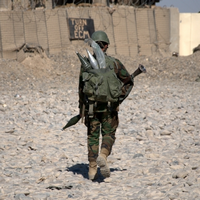The success of Operation Moshtarak, NATO's military offensive to seize the Taliban-controlled town of Marjah in Afghanistan's Helmand province, will be determined by how well coalition forces establish a functioning government now that the bulk of the actual fighting is over. Gen. Stanley McChrystal recently described the plan by saying, "We've got a government in a box, ready to roll in."
The concept of "government in a box," or a functioning government ready for immediate deployment the moment combat operations end, is a novel one. Most of the attention lavished upon ISAF's plans, however, has focused on the man chosen to lead the ready-made government, Haji Zahir.* An expatriate who returned to Afghanistan from Germany, Zahir certainly has his work cut out for him if he is to distance himself from the legacy of Marjah's previous government. Former police chief Abdul Rahman Jan and his men were infamous for beheading locals who refused to pay bribes, and were so violently abusive that the people of Marjah turned to the Taliban for protection.
But physical violence and the personalities of government are only one aspect of what will be required for a government to function right out of the box. Ultimately, a stable relationship between revenue -- in the form of taxes -- and services has to be established, otherwise the West will have to remain in Marjah, and Afghanistan, forever. Of course, the international community funds the vast majority of Afghanistan's national budget, a fact that is even more worrying given that the cost of maintaining the country's security forces will exceed its entire GDP in just a few years.

